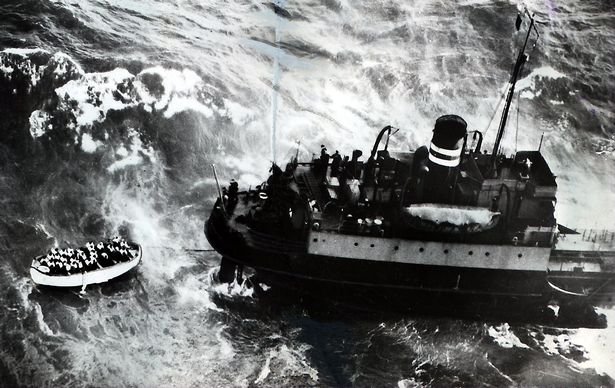1953 saw the coronation of Queen Elizabeth II, the first documented ascent of Mount Everest (by Edmund Hillary) and the discovery of the DNA double helix. More significant than any of those for our own part of the world however was the loss of the Princess Victoria. Seventy years on, the horror of the deadliest UK maritime disaster since WWII has not lessened – nor have the stories of bravery been forgotten. A painting of the disaster by Norman Whitla, a minister I had the privilege of knowing, provides a vivid portrayal of the disaster. The painting shows lifeboat number four, containing women and children, about to be dashed against the side of the ship. As a result, only men survived the disaster. 135 perished, and only 44 survived. Those who lost their lives included the Deputy Prime Minister of Northern Ireland, the MP for North Down – and 23 people from Stranraer. Communities on both sides of the Irish sea were rocked by the events of that day – and have not forgotten them. A BBC programme made to mark the fortieth anniversary was entitled ‘Things don’t happen to boats like this’. And yet, tragically, they did.
So how do we reflect on this disaster seventy years on?
Well surely we are right to remember and highlight the bravery of many on that day. As the 30,000-page report concluded, ‘If the Princess Victoria had been as staunch as those who manned her, then all would have been well and the disaster averted’. The bravery of the captains and crew of ships who responded to the Victoria’s SOS message – including those who dived into the water to help survivors – was also acknowledged by the awarding of medals.
No doubt many from that day down to ours have asked the question ‘Where was God on 31st January 1953’? Did Jesus not calm a storm when he was on earth? Leaving experienced fishermen – who had been terrified by the storm – even more scared to see it instantly cease when he spoke. Could he not have done it again?
It all brings to mind another January maritime disaster – the sinking of the HMY Iolaire at the entrance to Stornoway harbour on 1 January 1919. The Iolaire (Gaelic for Eagle) was bringing sailors who had fought in WWI home to the Isle of Lewis when she hit rocks and sank. At least 201 of the 283 on board perished – of whom 181 were islanders. Almost an entire generation of young men was lost.
The people of Lewis erected a memorial to the disaster in 1958. On it are the words of Psalm 77:19 in Gaelic – ‘Your way was through the sea, your path through the great waters; yet your footprints were unseen’. It was an acknowledgement that even in such a disaster, God was still sovereign. That even though his ways are often unseen to us, that doesn’t mean he is absent.
And surely we can say the same about the 31st of January 1953. The very fact that seventy years later we still remember it shows how valuable we consider human life to be. If, as we’re often told, human life is no different from animal life, why bother remembering? If life is really about the survival of the fittest, why do we believe that those who risked – or even gave – their lives to save others, did the morally right thing?
What is the greatest expression of love? It’s a question that evolution cannot answer.
But the Bible’s answer is: ‘Greater love has no one than this, that someone lay down his life for his friends’.
Jesus Christ – the one who uttered those words – demonstrated exactly what that sort of love looked like by going to the cross. As Jesus hung on the cross, it looked like God was absent. Jesus himself cried out ‘My God, my God, why have you forsaken me?’
And yet while it looked for all the world like God was absent – as it did 70 years ago too – he was anything but. He was making a way for us to be reconciled to him.
In a sense we could say that humanity at its best was seen on 31st January 1953. In the bravery displayed and the selfless sacrifice shown. Humanity at its best reflects the image of our maker. And yet it still falls short of his glory.
But on the cross, the Son of God in his perfect, sinless humanity, gave his life that we might believe in him and live with him forever.
Published in the Stranraer & Wigtownshire Free Press, 26 January 2023







